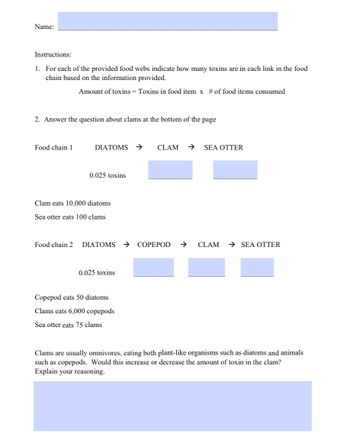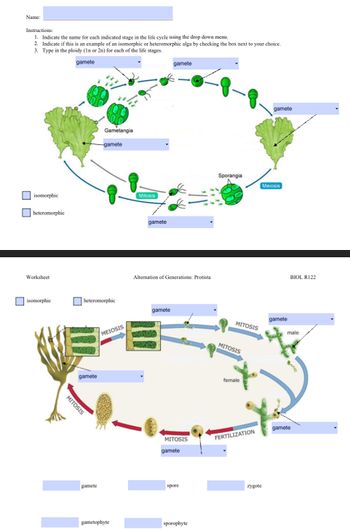
Human Anatomy & Physiology (11th Edition)
11th Edition
ISBN: 9780134580999
Author: Elaine N. Marieb, Katja N. Hoehn
Publisher: PEARSON
expand_more
expand_more
format_list_bulleted
Question
thumb_up100%
Explain why there that answer

Transcribed Image Text:Name:
Instructions:
1. For each of the provided food webs indicate how many toxins are in each link in the food
chain based on the information provided.
Amount of toxins = Toxins in food item x # of food items consumed
2. Answer the question about clams at the bottom of the page
Food chain 1
DIATOMS →
0.025 toxins
Clam eats 10,000 diatoms
Sea otter eats 100 clams
Food chain 2 DIATOMS
0.025 toxins
Copepod eats 50 diatoms
Clams eats 6,000 copepods
Sea otter eats 75 clams
CLAM → SEA OTTER
COPEPOD
CLAM → SEA OTTER
Clams are usually omnivores, eating both plant-like organisms such as diatoms and animals
such as copepods. Would this increase or decrease the amount of toxin in the clam?
Explain your reasoning.

Transcribed Image Text:Name:
Instructions:
1. Indicate the name for each indicated stage in the life cycle using the drop down menu.
2. Indicate if this is an example of an isomorphic or heteromorphic alga by checking the box next to your choice.
3. Type in the ploidy (In or 2n) for each of the life stages.
gamete
isomorphic
heteromorphic
Worksheet
isomorphic
MITOSIS
gamete
Gametangia
heteromorphic
gamete
gamete
MEIOSIS
gametophyte
Mitosis
gamete
Alternation of Generations: Protista
gamete
gamete
Cha
MITOSIS
gamete
spore
sporophyte
Sporangia
MITOSIS
MITOSIS
female
FERTILIZATION
zygote
gamete
Meiosis
gamete
BIOL R122
male
gamete
Expert Solution
This question has been solved!
Explore an expertly crafted, step-by-step solution for a thorough understanding of key concepts.
This is a popular solution
Trending nowThis is a popular solution!
Step by stepSolved in 2 steps

Knowledge Booster
Learn more about
Need a deep-dive on the concept behind this application? Look no further. Learn more about this topic, biology and related others by exploring similar questions and additional content below.Similar questions
- True or false: The "Miller Urey" experiment that found heating and cooling gases such as H20 and CH4 were able to produce small organic molecules. This proved that life originated on Earth through natural mechanisms.arrow_forwardA group of students wanted to learn how the concentration of copper in water affects the survivalarrow_forwardAccording to the Greco-Roman tradition, time is linear 2 cylical 3 punctuated 4 always decreasingarrow_forward
- Your answer A piece of DNA was analyzed and 15% of its nucleotides were adenine. What percentage would be uracil? * 15% 0% 30% O 60% Match the definition with the correct vocabulary word.* 8. h b O O O Oarrow_forwardi want to know if both statement are true or false. thank youarrow_forwardWhich ancient civilization was located at Aarrow_forward
- Evidence from a site in Kanjera, Kenya indicates that about two million years ago, early humans transported stone from its source of origin over seven miles to the site where it was recovered. Group of answer choices True Falsearrow_forwardA plant cell and an animal cell are shown below. Plant cell Animal cell Which conclusion can be made from these diagrams? A Plant and animal cells interact to make new organisms. B Nerve cells are present in plant and animal cells. Animal cells require oxygen to release the energy stored in food while plant cells do not.arrow_forwardA Moving to another question will save this response. Question 21 How many nucleotides would be required to synthesize a protein of 60 amino acids? 90 30 Moving to another question will save this response. MAY (30) 23 66 180 10 20 tv MacBook Air 3 Aarrow_forward
- Which of the characteristics of living things best explains why some North American birds fly south for the winterarrow_forwardQUESTION 2 The theory of evolution states that: O Over time, all living things gradually evolve to become better adapted to their environments until there is a perfect fit between the organism and its environment O Over time, simple organisms become more complex and advanced through evolution O All life on Earth is descended from a single common ancestor, and differences between organisms can all be attributed to evolutionary change O All evolution is caused by Natural Selection, in which individuals with genes that are better adapted to their environments are more likely to pass on those genes to their descendants, altering the allele frequency in the population over timearrow_forwardAccording to the theory of evolution by natural selection, speciesarrow_forward
arrow_back_ios
SEE MORE QUESTIONS
arrow_forward_ios
Recommended textbooks for you
 Human Anatomy & Physiology (11th Edition)BiologyISBN:9780134580999Author:Elaine N. Marieb, Katja N. HoehnPublisher:PEARSON
Human Anatomy & Physiology (11th Edition)BiologyISBN:9780134580999Author:Elaine N. Marieb, Katja N. HoehnPublisher:PEARSON Biology 2eBiologyISBN:9781947172517Author:Matthew Douglas, Jung Choi, Mary Ann ClarkPublisher:OpenStax
Biology 2eBiologyISBN:9781947172517Author:Matthew Douglas, Jung Choi, Mary Ann ClarkPublisher:OpenStax Anatomy & PhysiologyBiologyISBN:9781259398629Author:McKinley, Michael P., O'loughlin, Valerie Dean, Bidle, Theresa StouterPublisher:Mcgraw Hill Education,
Anatomy & PhysiologyBiologyISBN:9781259398629Author:McKinley, Michael P., O'loughlin, Valerie Dean, Bidle, Theresa StouterPublisher:Mcgraw Hill Education, Molecular Biology of the Cell (Sixth Edition)BiologyISBN:9780815344322Author:Bruce Alberts, Alexander D. Johnson, Julian Lewis, David Morgan, Martin Raff, Keith Roberts, Peter WalterPublisher:W. W. Norton & Company
Molecular Biology of the Cell (Sixth Edition)BiologyISBN:9780815344322Author:Bruce Alberts, Alexander D. Johnson, Julian Lewis, David Morgan, Martin Raff, Keith Roberts, Peter WalterPublisher:W. W. Norton & Company Laboratory Manual For Human Anatomy & PhysiologyBiologyISBN:9781260159363Author:Martin, Terry R., Prentice-craver, CynthiaPublisher:McGraw-Hill Publishing Co.
Laboratory Manual For Human Anatomy & PhysiologyBiologyISBN:9781260159363Author:Martin, Terry R., Prentice-craver, CynthiaPublisher:McGraw-Hill Publishing Co. Inquiry Into Life (16th Edition)BiologyISBN:9781260231700Author:Sylvia S. Mader, Michael WindelspechtPublisher:McGraw Hill Education
Inquiry Into Life (16th Edition)BiologyISBN:9781260231700Author:Sylvia S. Mader, Michael WindelspechtPublisher:McGraw Hill Education

Human Anatomy & Physiology (11th Edition)
Biology
ISBN:9780134580999
Author:Elaine N. Marieb, Katja N. Hoehn
Publisher:PEARSON

Biology 2e
Biology
ISBN:9781947172517
Author:Matthew Douglas, Jung Choi, Mary Ann Clark
Publisher:OpenStax

Anatomy & Physiology
Biology
ISBN:9781259398629
Author:McKinley, Michael P., O'loughlin, Valerie Dean, Bidle, Theresa Stouter
Publisher:Mcgraw Hill Education,

Molecular Biology of the Cell (Sixth Edition)
Biology
ISBN:9780815344322
Author:Bruce Alberts, Alexander D. Johnson, Julian Lewis, David Morgan, Martin Raff, Keith Roberts, Peter Walter
Publisher:W. W. Norton & Company

Laboratory Manual For Human Anatomy & Physiology
Biology
ISBN:9781260159363
Author:Martin, Terry R., Prentice-craver, Cynthia
Publisher:McGraw-Hill Publishing Co.

Inquiry Into Life (16th Edition)
Biology
ISBN:9781260231700
Author:Sylvia S. Mader, Michael Windelspecht
Publisher:McGraw Hill Education